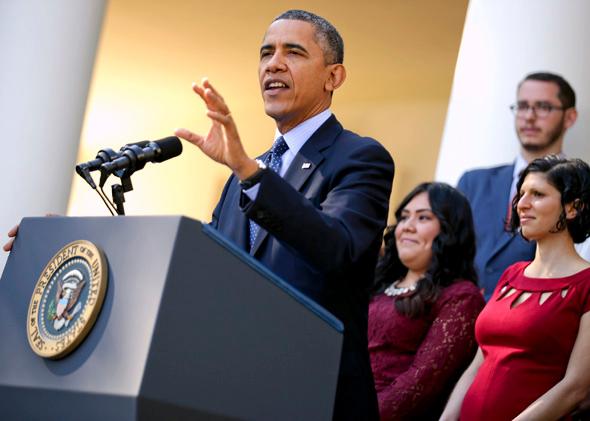An IT problem has never escalated faster than the president’s Rose Garden speech Monday addressing the problems with healthcare.gov. He could no longer outsource responding to user complaints. At first, the White House had said the headaches signing people up for health care coverage were just technical glitches, but now the sheer number of those glitches defies that explanation. Reporting about deeper systemic problems suggest that fixes will not come quickly. As my colleague Matthew Yglesias explains, adding more bodies to the problem adds more complexity, which may exacerbate the problem. It’s hard to untangle Christmas lights by committee.
Barack Obama doesn’t like to play the action-hero president where the application of his overwhelming will is supposed to directly correlate with a snappy solution. There are too many constraints on the presidency—Congress, a fickle public, world leaders, a $17 trillion economy, and the vagaries of time and space. But with the botched Obamacare rollout, the president was applying all the rhetorical torque he could muster. “Nobody’s madder than me about the fact that the website isn’t working as well as it should,” Obama said on Monday, “which means it’s going to get fixed.”
Rhetoric and will isn’t going to solve this problem. That helped the president triumph over the government shutdown and debt limit crisis, when through determination and superior political positioning he out maneuvered his Republican opponents. Now he has a different kind of challenge—an operational challenge—where his talent for politics and persuasion are less useful and may even make matters worse. Putting a good spin on things only sets expectations that can then be dashed by reality.
It’s a challenge of the president’s own making. Unlike his battle with Republicans over the serial budget crises or the economic mess or smoldering wars he inherited from the Bush administration, the president is not reacting to uncontrollable events. He can’t blame BP or Halliburton. The Affordable Care Act is his baby. Republicans made the rollout harder, but more than any other domestic challenge, his administration should have been able to anticipate the problems they’re now scrambling to fix.
In the Rose Garden on Monday morning, the president had a tough balancing act. On the one hand, he wanted to show that he was personally peeved, but he also had to simultaneously argue that the problems that made him so angry weren’t threatening the underlying health of the product. That’s a proposition that has yet to be tested. There are substantive ways in which the rollout can damage the fundamental enterprise. If the problems are as systemic as some reporting suggests, then they will not be fixed easily or anytime soon. The premise of the website was that its rollout would initiate a wave of social media success stories that would reach those younger applicants who are so vital to Obamacare’s success. Younger, healthy people must sign up to keep the insurance pools from being dominated by older sicker Americans, an outcome that would make prices soar. But those great sign up stories are not filtering through social media to this hard-to-reach group. Instead, they’re hearing that the program is a mess. If enough young people don’t sign up, then the death-spiral scenario kicks in.
The president’s speech was just the latest attempt to put the problems with healthcare.gov into perspective—a job that is not going well. Before the site was launched, the president said it would make signing up for health care as easy as making a plane reservation. When, after a few rocky days that turned out to be too rosy, the administration dropped the airline analogy. Now the experience more closely approximates the saga of having your flight delayed. First, the airline tells you it will be a half hour, then it stretches it to an hour, then two, then you’re offered a voucher for a drink. After four hours, it dawns on you that the plane is never taking off. They continue to assure you it will—just before they cancel your flight.
The stories keep shifting. Administration officials said the site had been tested as thoroughly as the IRS computer systems that handle electronic tax returns. Now Health and Human Services Secretary Kathleen Sebelius admits the system wasn’t tested enough. In the first several days, administration officials spoke of “glitches,” and Secretary Sebelius asked that people give the government the same amount of slack Apple gets when it launches a new product. But the administration dropped that analogy because, unlike Apple’s quick admission that Apple Maps was a mess, the government can’t just let users install Google Maps (and there have been no quick firings for the mess, as there were at Apple). The president and his team then said the website snafus were the result of huge traffic, but that explanation doesn’t explain the considerable technical problems now being reported. Reports of the extraordinary number of people who have accessed the site are themselves full of fuzzy claims that seek to oversell the success.
There’s a dangerous spiral that can take hold in these situations, as spin intended to distract from the current mess becomes its own problem. That is especially true when the facts demonstrate that the story the administration was selling is too optimistic: Either the White House knew how bad things were and wasn’t playing it straight or it didn’t know how bad things were and is just inept. Which one the public chooses—or whether they forgive the launch pad mishaps when everything is repaired—depends on the administration’s operational, rather than its political, skill. The customer support ticket has reached the highest level; now the country must wait.
